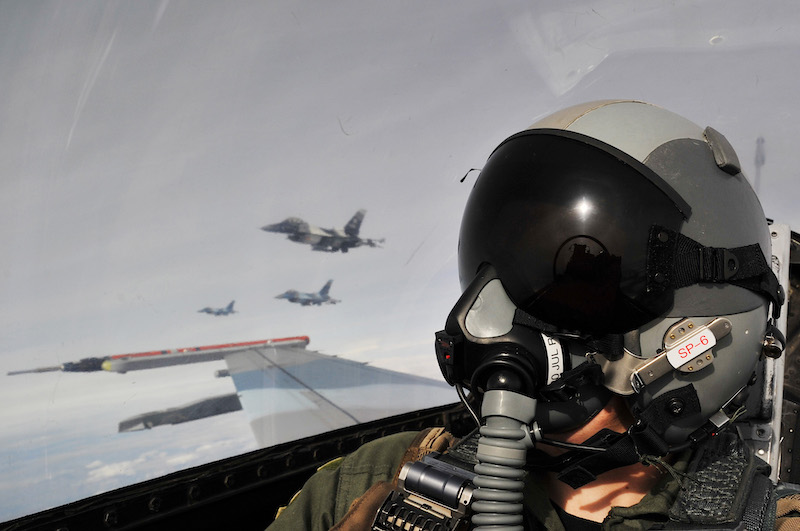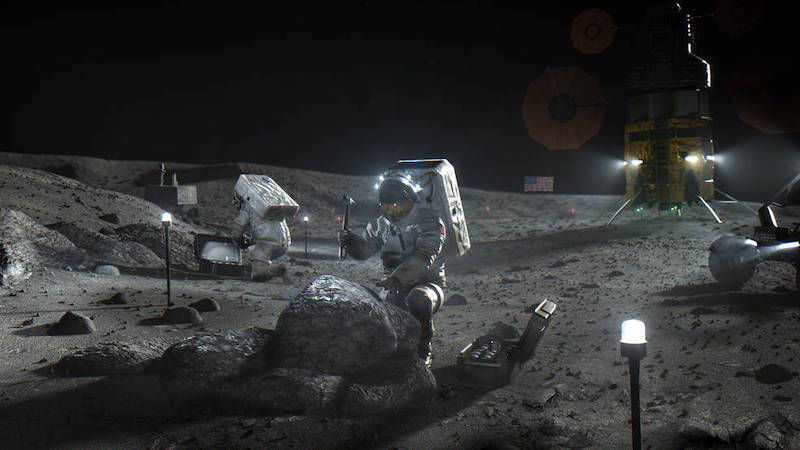
Brain changes in fighter pilots
Here’s an interesting study from Belgium, described in Frontiers Science News on February 15, 2023. We know that space travel can have significant effects on the human body. But how about the brain? The new study, the 1st of its kind, investigated functional brain connectivity – that is, how different regions of the brain interact with each other – in fighter pilots. The researchers said the specific changes in the brain they found might occur for astronauts, too.
Researchers at several universities and institutions in Belgium worked together on this study. They published the new peer-reviewed findings on February 15 in the journal Frontiers in Physiology.
As senior author Floris Wuyts of the University of Antwerp explained at InterestingEngineering.com:
Fighter pilots have some interesting similarities with astronauts, such as exposure to altered g-levels, and the need to interpret visual information and information coming from head movements and acceleration (vestibular system information).
By establishing the specific brain connectivity characteristics of fighter pilots, we can gain more insight into the condition of astronauts after spaceflight.
Here’s what they did
The researchers compared the brains of 10 F-16 fighter pilots from the Belgian Air Force with those of 10 non-pilots. They used magnetic resonance imaging scans, aka MRI scans, to study how different regions of the brain were interacting in both groups.
As author Elizabeth Howell noted in her article on Space.com, F-16 pilots must be able to withstand up to nine Gs (nine times the normal force of gravity on the human body).
According to these scientists, that amount of gravitational force can have significant effects on both the human brain and body overall.
Last chance to get a moon phase calendar! Only a few left. On sale now.
And here’s what they found
Their 1st finding wasn’t a surprise. That’s because they found the changes in the pilots’ brains increased with the number of flight hours.
They also found that – in the pilots’ brains – the part of the brain processing sensorimotor information displayed less connectivity with other parts of the brain. They said this is preliminary evidence that the human brain can adapt to the extreme conditions of spaceflight.
There were changes in other areas of the brain, too: the parts of the brain concerned with cognitive functions, with each pilot’s sense of balance, and with visual information. All these brain regions were more connected in the fighter pilots.
So – not surprisingly – it seems that pilots need to process multiple stimuli at the same time. Consequently, the brain prioritizes the most important stimuli, like reading cockpit instruments. First author Wilhelmina Radstake said:
By demonstrating that vestibular and visual information is processed differently in pilots compared to non-pilots, we can recommend that pilots are a suitable study group to gain more insight into the brain’s adaptations toward unusual gravitational environments, such as during spaceflight.

Pilots and astronauts
As a matter of fact, pilots’ brains have a lot in common with those of astronauts. This includes altered gravity and rapidly processing conflicting sensory information. Therefore, these results provide crucial insight into how spaceflight affects astronauts’ brains. Scientists will be able to use the data to help improve training programs for astronauts in the future. This is essential, given how dangerous being an astronaut can be. Being able to make quick and necessary decisions is extremely important. This will be especially crucial for longer-duration space missions, such the upcoming Artemis missions to the moon and maybe eventually Mars. The press release stated:
Understanding these changes could help us to better prepare astronauts for long journeys, which is crucial if we are ever to reach other planets.
Interestingly, an earlier study in 2017 found that astronauts’ brains actually change shape slightly in space. The researchers noticed that the gray matter in the brain decreased in volume in some regions and increased in others.
In 2021, researchers found that, due to cognitive decline, long trips to Mars could cause astronauts to misread emotions. They might be more likely to perceive facial expressions as angry. Yikes!
Fighter pilots and astronauts may be different professions, but they share a lot in common. Especially, for the humans involved, their brains.
Bottom line: Researchers in Belgium showed how brain changes in pilots can help astronauts cope with the effects of space travel.
Source: Neuroplasticity in F16 fighter jet pilots
Via InterestingEngineering.com
The post Will brain changes in fighter pilots help astronauts? first appeared on EarthSky.
from EarthSky https://ift.tt/WF0hpns

Brain changes in fighter pilots
Here’s an interesting study from Belgium, described in Frontiers Science News on February 15, 2023. We know that space travel can have significant effects on the human body. But how about the brain? The new study, the 1st of its kind, investigated functional brain connectivity – that is, how different regions of the brain interact with each other – in fighter pilots. The researchers said the specific changes in the brain they found might occur for astronauts, too.
Researchers at several universities and institutions in Belgium worked together on this study. They published the new peer-reviewed findings on February 15 in the journal Frontiers in Physiology.
As senior author Floris Wuyts of the University of Antwerp explained at InterestingEngineering.com:
Fighter pilots have some interesting similarities with astronauts, such as exposure to altered g-levels, and the need to interpret visual information and information coming from head movements and acceleration (vestibular system information).
By establishing the specific brain connectivity characteristics of fighter pilots, we can gain more insight into the condition of astronauts after spaceflight.
Here’s what they did
The researchers compared the brains of 10 F-16 fighter pilots from the Belgian Air Force with those of 10 non-pilots. They used magnetic resonance imaging scans, aka MRI scans, to study how different regions of the brain were interacting in both groups.
As author Elizabeth Howell noted in her article on Space.com, F-16 pilots must be able to withstand up to nine Gs (nine times the normal force of gravity on the human body).
According to these scientists, that amount of gravitational force can have significant effects on both the human brain and body overall.
Last chance to get a moon phase calendar! Only a few left. On sale now.
And here’s what they found
Their 1st finding wasn’t a surprise. That’s because they found the changes in the pilots’ brains increased with the number of flight hours.
They also found that – in the pilots’ brains – the part of the brain processing sensorimotor information displayed less connectivity with other parts of the brain. They said this is preliminary evidence that the human brain can adapt to the extreme conditions of spaceflight.
There were changes in other areas of the brain, too: the parts of the brain concerned with cognitive functions, with each pilot’s sense of balance, and with visual information. All these brain regions were more connected in the fighter pilots.
So – not surprisingly – it seems that pilots need to process multiple stimuli at the same time. Consequently, the brain prioritizes the most important stimuli, like reading cockpit instruments. First author Wilhelmina Radstake said:
By demonstrating that vestibular and visual information is processed differently in pilots compared to non-pilots, we can recommend that pilots are a suitable study group to gain more insight into the brain’s adaptations toward unusual gravitational environments, such as during spaceflight.

Pilots and astronauts
As a matter of fact, pilots’ brains have a lot in common with those of astronauts. This includes altered gravity and rapidly processing conflicting sensory information. Therefore, these results provide crucial insight into how spaceflight affects astronauts’ brains. Scientists will be able to use the data to help improve training programs for astronauts in the future. This is essential, given how dangerous being an astronaut can be. Being able to make quick and necessary decisions is extremely important. This will be especially crucial for longer-duration space missions, such the upcoming Artemis missions to the moon and maybe eventually Mars. The press release stated:
Understanding these changes could help us to better prepare astronauts for long journeys, which is crucial if we are ever to reach other planets.
Interestingly, an earlier study in 2017 found that astronauts’ brains actually change shape slightly in space. The researchers noticed that the gray matter in the brain decreased in volume in some regions and increased in others.
In 2021, researchers found that, due to cognitive decline, long trips to Mars could cause astronauts to misread emotions. They might be more likely to perceive facial expressions as angry. Yikes!
Fighter pilots and astronauts may be different professions, but they share a lot in common. Especially, for the humans involved, their brains.
Bottom line: Researchers in Belgium showed how brain changes in pilots can help astronauts cope with the effects of space travel.
Source: Neuroplasticity in F16 fighter jet pilots
Via InterestingEngineering.com
The post Will brain changes in fighter pilots help astronauts? first appeared on EarthSky.
from EarthSky https://ift.tt/WF0hpns

Aucun commentaire:
Enregistrer un commentaire